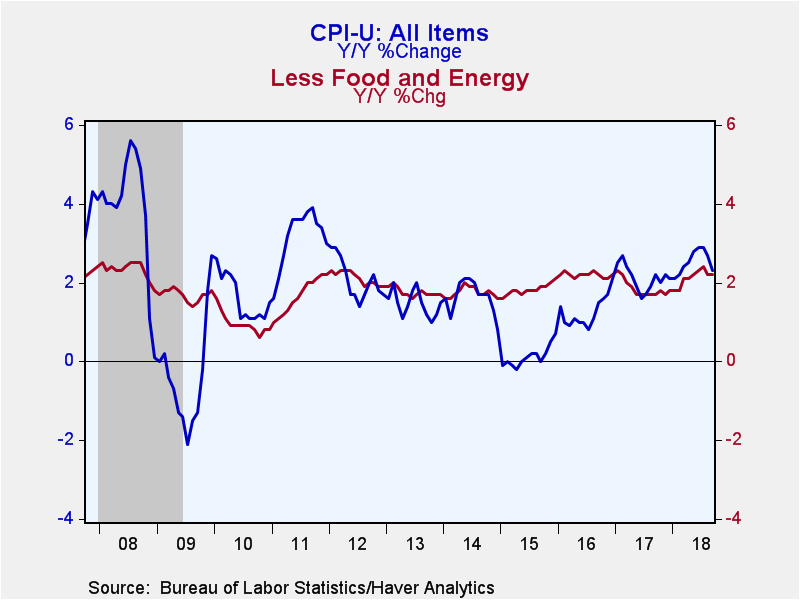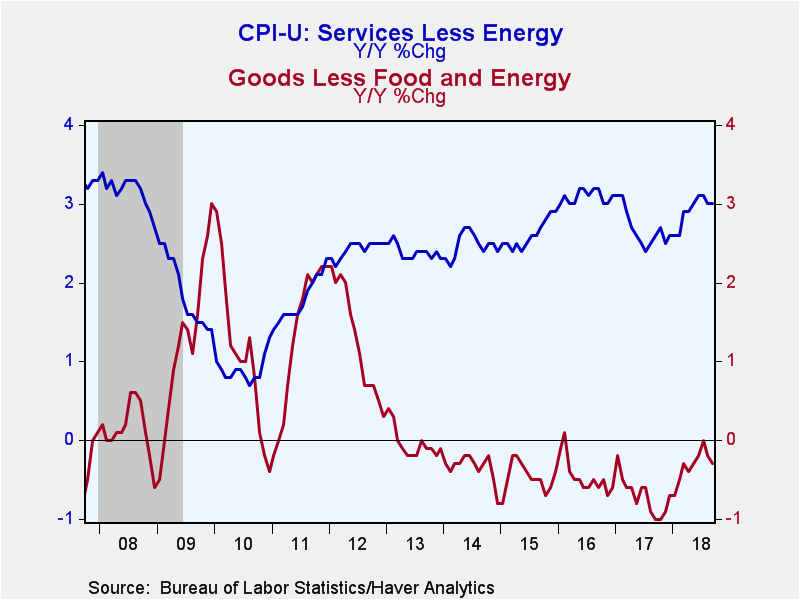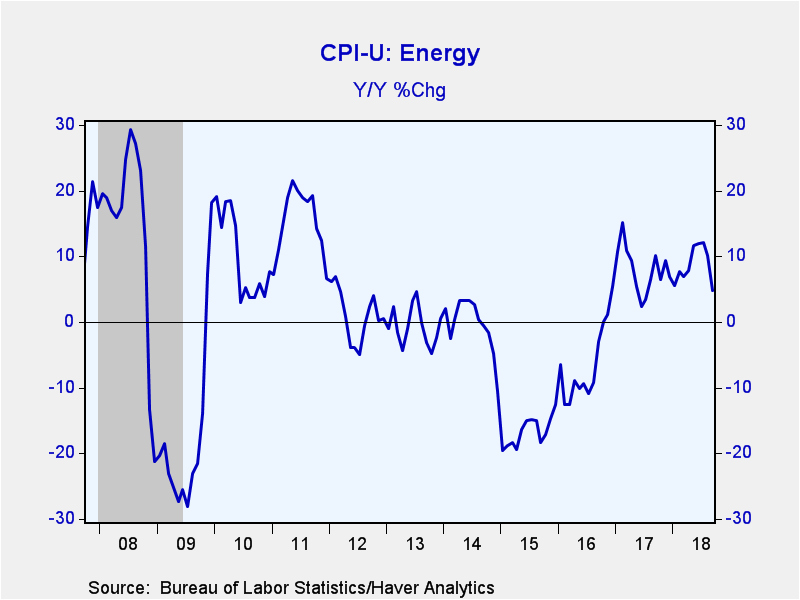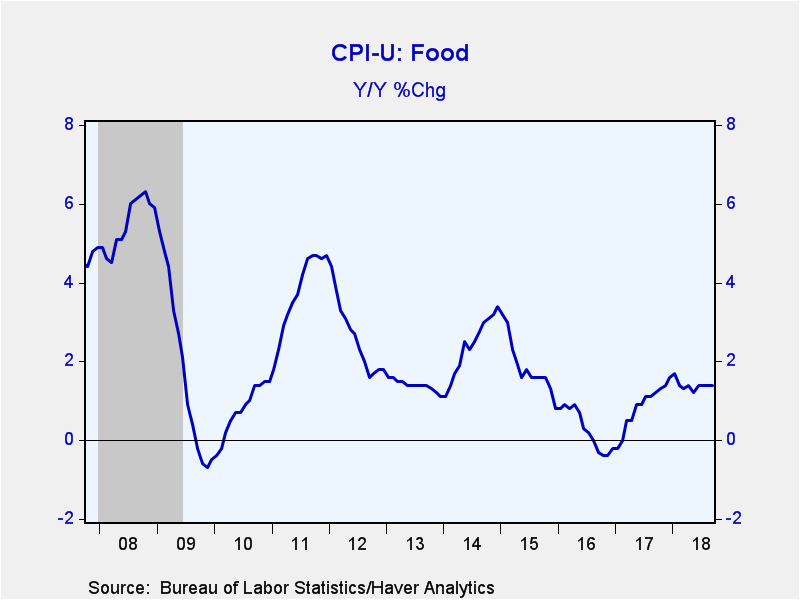 Global| Oct 11 2018
Global| Oct 11 2018U.S. CPI & Core CPI Edge Higher
by:Tom Moeller
|in:Economy in Brief
Summary
Consumer price inflation remained subdued last month due to broad-based weakness. The CPI rose 0.1% (2.3% y/y) during September following two straight 0.2% gains. The increase fell short of expectations for a 0.2% gain in the Action [...]
Consumer price inflation remained subdued last month due to broad-based weakness. The CPI rose 0.1% (2.3% y/y) during September following two straight 0.2% gains. The increase fell short of expectations for a 0.2% gain in the Action Economics Forecast Survey. The CPI excluding food & energy also inched up 0.1% (2.2% y/y) for the second straight month, following three consecutive months of 0.2% increase. A 0.2% rise had been expected.
Weakness in last month's CPI increase was led by a second straight 0.3% monthly decline (-0.3% y/y) in goods prices excluding food & energy. Used car & truck prices led the shortfall as they plummeted 3.0% (-1.5% y/y). New car & truck prices eased 0.1% (+0.5% y/y). Continuing to the downside were recreation goods prices by 0.6% (-3.3% y/y). A 1.9% decline in television prices (-18.6% y/y) paced the shortfall. Also weak were sporting goods prices which fell 0.9% (-0.5% y/y). Medical care product prices eased 0.1% (+0.7% y/y), the smallest of three consecutive monthly declines. Elsewhere, leading the increases in pricing power was a 0.9% rise (-0.6% y/y) in apparel prices which followed four straight months of decline. Home furnishings prices gained 0.2% and were unchanged y/y, while appliance costs improved 0.2% (2.9% y/y). Tobacco prices gained 0.3% (3.2% y/y).
Nonenergy service price inflation held steady at 0.2% (3.0% y/y). Recreation services prices strengthened 0.7% (1.9% y/y), the largest increase since February 2017. Transportation services prices increased 0.5% (4.0% y/y) as car & truck rental costs rebounded 2.2% (-1.8% y/y) after a sharp August decline. Public transportation prices rose 0.4% (-0.2% y/y). Shelter prices increased 0.2% (3.3% y/y) as the owners' equivalent rent of primary residences rose 0.2% (3.3% y/y), down versus the 0.3% increases in each of the prior six months. Rents also increased a lessened 0.2% (3.6% y/y). The cost of medical care services rose 0.2% (2.0% y/y). Tuition costs and other schools fees & child care inched 0.1% higher (2.6% y/y).
Countering these increases was a 0.5% decline (+4.8% y/y) in energy prices which followed a 1.9% rise. The decline was led by a 1.7% drop (-1.2% y/y) in natural gas prices. Electricity prices also fell 0.5% (-1.2% y/y). Gasoline prices eased 0.2% (9.1% y/y) after a 3.0% rise, and the cost of fuel oil improved 0.3% (23.4% y/y) following a 2.2% rise.
Food prices held steady in September (1.4% y/y) after two straight 0.1% gains. Cereal & bakery product prices strengthened 0.6% (0.7% y/y). Nonalcoholic beverage prices rose 0.6% both m/m and y/y. Egg prices declined 4.1% (+10.1% y/y), down for the fifth straight month. Meat, poultry and fish prices fell 0.8% (-0.1% y/y) after a 0.2% rise, while dairy product prices eased 0.3% (unchanged y/y) following a 0.1% uptick. Fruit & vegetable prices declined 0.5% (+0.5% y/y) after a 0.3% fall.
The modest gain in consumer prices caused real average hourly earnings to increase 0.3% (0.5% y/y), the strongest gain in six months.
The consumer price data can be found in Haver's USECON database with additional detail in CPIDATA. The Action Economics survey figure is in the AS1REPNA database.
| Consumer Price Index, All Urban Consumers (% chg) | Sep | Aug | Jul | Sep Y/Y | 2017 | 2016 | 2015 |
|---|---|---|---|---|---|---|---|
| Total | 0.1 | 0.2 | 0.2 | 2.3 | 2.1 | 1.3 | 0.1 |
| Total less Food & Energy | 0.1 | 0.1 | 0.2 | 2.2 | 1.8 | 2.2 | 1.8 |
| Goods less Food & Energy | -0.3 | -0.3 | 0.1 | -0.3 | -0.7 | -0.5 | -0.5 |
| Services less Energy | 0.2 | 0.2 | 0.3 | 3.0 | 2.7 | 3.1 | 2.6 |
| Food | 0.0 | 0.1 | 0.1 | 1.4 | 0.9 | 0.3 | 1.9 |
| Energy | -0.5 | 1.9 | -0.5 | 4.8 | 7.9 | -6.6 | -16.7 |
Tom Moeller
AuthorMore in Author Profile »Prior to joining Haver Analytics in 2000, Mr. Moeller worked as the Economist at Chancellor Capital Management from 1985 to 1999. There, he developed comprehensive economic forecasts and interpreted economic data for equity and fixed income portfolio managers. Also at Chancellor, Mr. Moeller worked as an equity analyst and was responsible for researching and rating companies in the economically sensitive automobile and housing industries for investment in Chancellor’s equity portfolio. Prior to joining Chancellor, Mr. Moeller was an Economist at Citibank from 1979 to 1984. He also analyzed pricing behavior in the metals industry for the Council on Wage and Price Stability in Washington, D.C. In 1999, Mr. Moeller received the award for most accurate forecast from the Forecasters' Club of New York. From 1990 to 1992 he was President of the New York Association for Business Economists. Mr. Moeller earned an M.B.A. in Finance from Fordham University, where he graduated in 1987. He holds a Bachelor of Arts in Economics from George Washington University.










